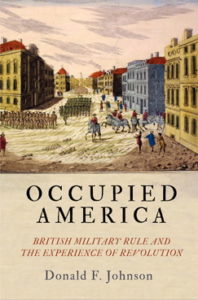Donald F. Johnson. Occupied America: British Military Rule and the Experience of Revolution. University of Pennsylvania Press, 2020. ISBN: 9780812252545. 256 pages. $35.95USD.
By Joshua Shepherd
 In recent years there’s been a resurgence of interest in the Revolution and Founding Era. It’s resulted in a prolific number of new volumes, including a good number of narrowly-focused “micro histories” which address previously neglected topics. With the release of Occupied America: British Military Rule and the Experience of Revolution, author Donald Johnson has endeavored to address one such notable gap in the historiography.
In recent years there’s been a resurgence of interest in the Revolution and Founding Era. It’s resulted in a prolific number of new volumes, including a good number of narrowly-focused “micro histories” which address previously neglected topics. With the release of Occupied America: British Military Rule and the Experience of Revolution, author Donald Johnson has endeavored to address one such notable gap in the historiography.
Between 1775 and 1783, every major city on America’s eastern seaboard, including Boston, New York, Newport, Philadelphia, Charleston, and Savannah, was occupied at least briefly by Crown forces. The primary need to control such locales was obvious. With an army in the field over three thousand miles from the home islands, Britain was logistically compelled to have access to deep water ports.
It was also hoped that occupation of the commercial, trade, and social centers of the colonies would afford the Crown the ability to gradually expand geographic control of the countryside and reassert authority over the colonies. Johnson’s research, however, doesn’t focus on British military policy. In keeping with the current academic trend toward social history, this volume centers heavily on the day-to-day experiences of civilians, with a particular focus on how British occupation afforded both challenge and opportunity for common men and women.
Johnson’s work offers a chronological collection of fascinating vignettes of lives torn asunder by war. Although the presence of thousands of newcomers offered enterprising individuals unprecedented opportunity, the inevitable destruction of a functioning economy, which resulted in soaring prices and rampant inflation, only antagonized a civilian population that very often adhered to a pragmatic neutrality. Paired with infringements on traditional English liberties, British occupation policies were a recipe for disaster.
Ultimately, the promise of social stability and economic prosperity under restored British rule proved a chimera. In the absence of substantive military victory in the field, the resumption of any form of normalcy in civil government was impossible. The draconian restraints of martial law, for which British military commanders had no real alternative, ultimately rendered life in the occupied zones distasteful to Loyalists and repugnant to Patriots.
Ironically, the heavy-handed implementation of such arbitrary rule was a self-defeating course of action. Prior to the outbreak of the war, Whig leaders had warned of a creeping tyranny as Royal appointees ignored or even dissolved popularly-elected legislative bodies. “By the end of the war,” argues Johnson, “the experience of occupation had weakened imperial authority to its breaking point” (p. 5).
Johnson champions the notion that “the wartime experience of occupation, more than radical political arguments during the imperial crisis, caused many to abandon their faith in royal rule” (p. 2). It should be remembered that Johnson’s research focuses heavily on those with nebulous political beliefs who attempted to navigate the difficult period of military occupation in America’s six largest cities. At the outbreak of the war, it’s thought that those cities boasted no more than one percent of the colonial population, and those populations shrank dramatically when Whig refugees fled the approach of British armies.
Ideology is a powerful force. Although it’s certainly true that early America contained a good number of the “disaffected” – those whose loyalties were quite flexible and reactionary to the shifting fortunes of war, Revolutionary America also contained a good number of men and women – both Patriot and Loyalist – who were more than willing to sacrifice their fortunes, and their lives, on the simple grounds of deeply-held principle.
Occupied America offers an intriguing glimpse at a narrow topic that has hitherto suffered an unfortunate neglect in the historiography of early America. This book is best suited to a professional audience, particularly social historians. By exploring previously obscure primary sources, Donald Johnson has penned an important contribution to the literature covering military occupation during the Revolutionary War.
Joshua Shepherd, a sculptor and independent researcher, has created over 30 public monuments. His articles, with a special focus on Revolutionary and frontier America, have appeared in publications including MHQ: The Quarterly Journal of Military History, Military Heritage, Journal of the American Revolution, and Civil War Quarterly.







